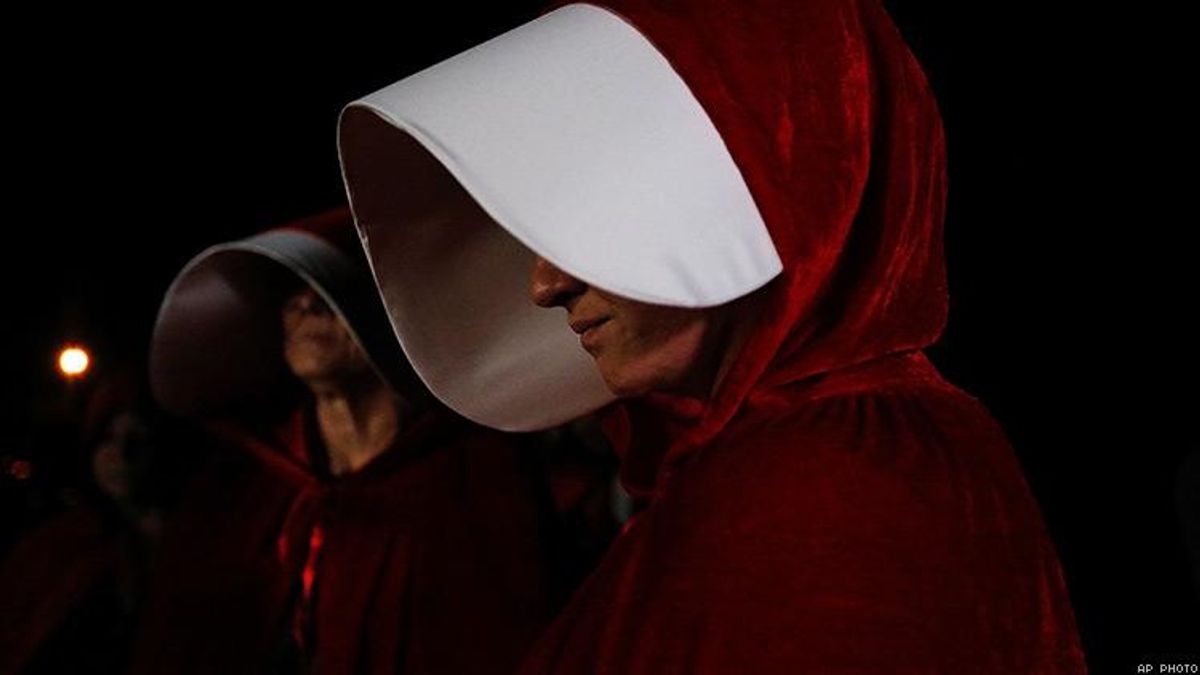Since taking office, Donald Trump has been no friend to women, continually assailing women's access to health care, working to defund Planned Parenthood, and rolling back campus rape protections. So it's no surprise that his Supreme Court justice nominee Brett Kavanaugh could pose a threat to Roe v. Wade, the landmark case that legalized a woman's right to an abortion.
As the Kavanaugh Senate confirmations hearings got under way Tuesday, a group of women dressed like the repressed sex slaves of the not-so-distant dystopia in The Handmaid's Tale, the Margaret Atwood novel that is now a critically acclaimed Hulu series, according to HuffPost.
Since Trump took office, the resisting handmaids, in their signature crimson robes and lily-white sight-restricting bonnets, have protested threats to women's reproductive rights around the country. Most recently, the handmaids turned up in New York City to protest Mike Pence's and Department of Homeland Security Kirstjen Nielsen's participation in a summit.
In a scene eerily reminiscent of an episode in The Handmaid's Tale's second season in which the imprisoned women, valued merely for the viability of their reproductive organs, lined the atrium of a meeting hall where their male captors sat below deciding policy, women at Kavanaugh's hearing stood silently side-by-side as a rebuke to his nomination.
Kavanaugh's comments regarding Roe v. Wade have been vague, including his statement to Sen. Susan Collins that he considers it "settled law." But women's rights activists fear that Trump's nominee could offer the fifth vote in a conservative-leaning Supreme Court that could once again allow states to ban abortion.
Kavanaugh's career offers some insight into how me might vote on abortion. In 2017 he dissented from a federal court ruling that allowed an undocumented teenage immigrant to undergo an abortion. He wrote that the teen was "alone and without family or friends" and that she should wait until she was with a sponsor before obtaining the abortion. The wait would have pushed her into the second trimester.
Sen. Dianne Feinstein cited the case while speaking out against Kavanaugh's confirmation at the hearing. She said that his dissent in that case "rewrote Supreme Court precedent."
"[Kavanaugh's dissent] demonstrates that you are willing to disregard precedent" -- that is, that he'd be perfectly willing to unsettle "settled law," Feinstein said, according to Vox.
Feinstein extrapolated the implications of Roe v. Wade out to other landmark decisions, including marriage equality.
Overturning Roe could have wide-ranging consequences for Americans' personal liberty. "Roe is one in a series of cases that upheld an individual's right to decide who to marry," Feinstein said. "I deeply believe that all these cases serve as a bulwark of privacy rights that protect all Americans from overinvolvement of the government in their lives. To me, that is extraordinarily important."



















































































